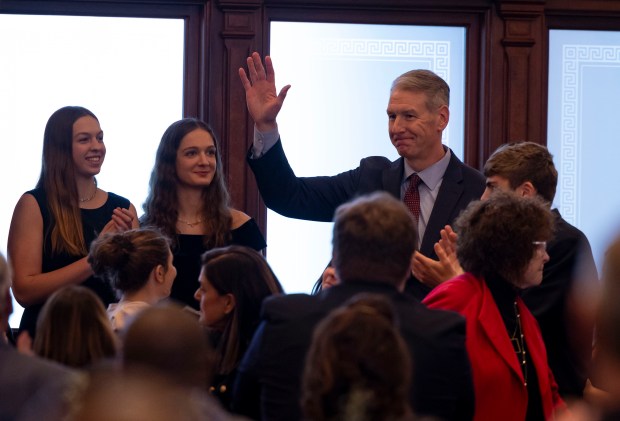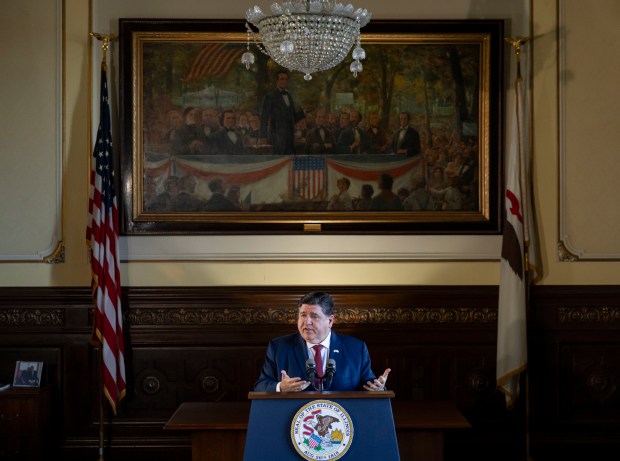SPRINGFIELD — The Illinois General Assembly launched a new two-year term on Wednesday with inauguration ceremonies that came on the heels of a tension-filled lame duck session marked by sparring between Democratic Gov. JB Pritzker and members of his own party.
Pritzker, who handled the task of swearing in the Senate in its newly-renovated statehouse chamber, acknowledged that the new legislative session provides an opportunity for a fresh start in his relationship with legislative Democrats, including House Speaker Emanuel “Chris” Welch.
Pritzker unsuccessfully championed a measure to regulate hemp products during the lame duck session and accused at least one House Democrat of berating state agency workers who were called to a closed-door meeting to answer questions about the bill, which Welch eventually decided not to call it for a vote.
“Everyday’s a new day to do the right thing,” Pritzker said during a news conference in his ceremonial office at the state Capitol after the Senate inauguration. “Look, people can make mistakes, and certainly mistakes were made and behavior was improper during that caucus. But people can make amends and we can all move on.”
Pritzker, Welch and Democratic Senate President Don Harmon have their work cut out for the in the coming months as they deal with issues led by a projected $3.2 billion budget shortfall.
The Democrats have also talked about potential need for legislation to counter federal action that might be taken by Republican President-elect Donald Trump’s administration in areas such as immigration, abortion rights and environmental policy.
Pritzker reiterated the importance of responding to federal actions his administration sees as adverse for Illinois under the Trump administration. But he made clear that right now, there’s no way to tell what will actually happen once Trump takes office.
“We don’t know what they’re going to do. And it’s so unpredictable that we need to consider that as we’re putting a budget together and debating it over the next 4 ½ months or so,” Pritzker said at his post-inauguration news conference when asked about how Trump’s policies might affect the state budget.
More concrete questions facing legislators include how to fix the state’s pension system, whether the Chicago area’s transit agencies should be consolidated and determining whether Chicago’s public schools should get a boost in funding.
The path to a budget, however, may be the biggest challenge.
Last May, the Democrats’ legislative dominance was put to the test as House lawmakers struggled to pass a $750 million tax hike package. It took three attempts to pass and a series of procedural maneuvers in the overnight hours to balance a $53.1 billion spending plan.
But those tax hikes were passed after a projected budget shortfall of close to $900 million, far less than what the state faces this year.
Pritzker, who again shrugged off the projected shortfall and promised another balanced spending plan, declined to provide a preview of the budget proposal he’s scheduled to unveil next month, included whether it will include tax cuts or hikes.
“I’ve got all of my team working on making sure that we’re addressing the highest needs in the budget and then, importantly, doing something that I think is a hallmark of our administration, which is being fiscally responsible,” he said. “So we’re going to do that.”
Going into the November election, Democrats held 78 of the 118 House seats, giving them the largest supermajority over Republicans in modern state history. There were new lawmakers who took part in Wednesday’s inaugurations, but the Democratic margins remained the same in both the House and the Senate.
In House inauguration ceremonies in an auditorium at the University of Illinois Springfield campus, Welch was reelected to the speaker’s post for the third time by his colleagues in the Democratic caucus. Rep. La Shawn Ford, a Chicago Democrat who was a staunch proponent of the hemp bill and Pritzker’s efforts to push it forward, was the only representative to stand up to announce his vote for Welch.
In his remarks before the vote, Welch warned against “cruel and regressive policies.”
“I’ll tell you right now, we will have no home in Illinois for those policies,” Welch said to hearty applause. “For those whose goal is simply performative outrage and provocation will find that this House will not waste the people’s time on their games.”
“And those who wrongly believe their job here is simply to say ‘no’ will find that decisions are made by those with the sincere desire and the moral clarity to get to ‘yes,’” he said.
Republican lawmakers sat quietly and did not clap for Welch. House Republican leader Tony McCombie, of Savanna, and Welch shook each other’s hands after they were formally re-installed as leaders of their caucuses. But in her remarks she made clear she did not feel included by Welch in his caucus’ decision-making process.
“As we kick off this next session, I’m not asking for an invitation to your table, speaker. But know that your members and your team are always welcome at mine,” McCombie said. “When you are ready to solve real problems, we have solutions.”
Two years ago, McCombie was elected as the first female House leader in Illinois history, and at that time, gave a hopeful speech about bipartisanship.
On Wednesday, she called her 2023 expectations naive and sarcastically commented after Welch’s speech, “sounds like it’s a new day in Illinois.”
“You got that right,” Welch said, before McCombie added, “We’ll see how it goes.”
McCombie attributed November’s election, in which the Republican party did not gain any seats, to “the most outrageous (House district) maps in the nation.” At one point in her speech, Welch had to quiet arguing and shouting in the crowd.

The Senate inauguration ceremony was more cordial. Harmon and Sen. John Curran, the chamber’s Republican leader, voted for each other in a time-honored Senate tradition between the two parties.
In his brief address to the chamber, Harmon urged senators to forge bonds, mentor newer senators and look out for one another.
“The senators sitting on the opposite side of the room are here for the same reason you are. They want to serve Illinoisans and make our state a better place,” the Oak Park Democrat said. “We’ll often disagree about how to reach our goals. We will often become passionate when advocating for our causes but we will all be more productive and do more good if we remember that our political counterparts are also our neighbors.”
In his speech, Curran talked about his immigrant parents and their influence on his life while also taking a not-so-subtle dig at Democrats.
“They taught me that here in Illinois, anything is possible,” Curran, of Downers Grove, said of his parents. “And as my colleagues on this side of the aisle have watched over the last several years, boy, is anything possible.”
“We can and we will disagree on policy, on procedure and just about everything else in this chamber,” Curran said. “But there is no disagreement that we are all here because we share in the commitment to making our state a better place for future generations. It’s what unites us. Every member has something, an expertise, a passion, an idea that they can bring to the table.”




